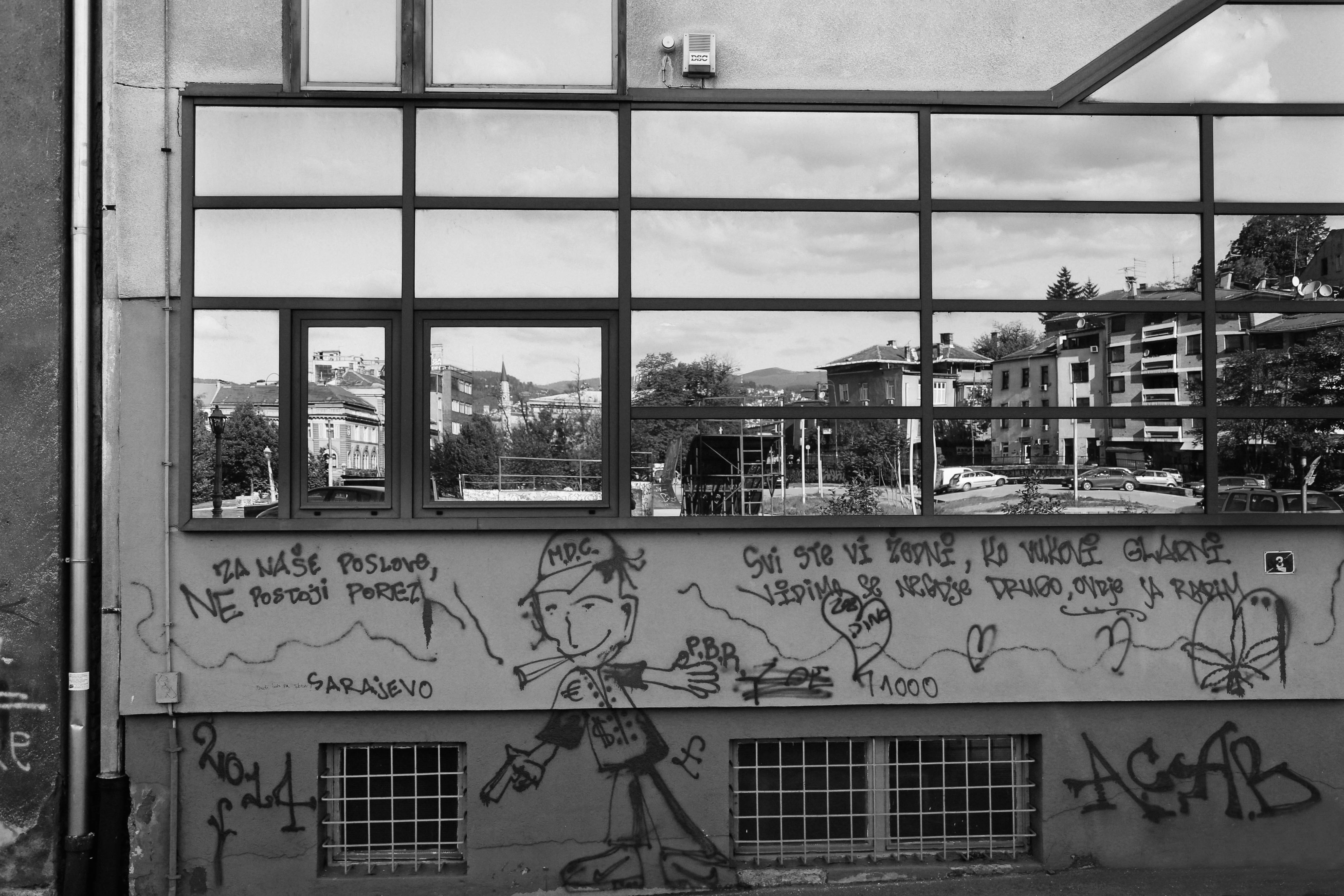Blacklisted by the government, foreign-funded NGOs in Bosnia’s Serb Republic are being forced to declare themselves “foreign agents.” Here, a look at one organization struggling to have its voice heard despite being targeted by what they’re calling “Putin’s Law.”
By Skyler Inman
[divider]
[dropcap]A[/dropcap] ghoulish, blue-grey hand extends out of the darkness, a red string hanging from each finger. Below, a limp wooden marionette hangs suspended, its segmented arms spread as though crucified. In large white print, the book’s title: Rušenje Republike Srpske, or in English, The Destruction of the Serb Republic. The 250-page publication was an initiative of the Union of Independent Social Democrats (known as the SNSD), the majority party in the Republika Srpska, Bosnia’s administrative entity for Serbs. The publication’s main thesis: the West is destroying Serb unity, and in doing so, is destroying the Serb Republic within Bosnia. The solution: root out Western influence and control it. One method: a law proposed in May of this year that many activists have called oppressive, backwards, and alienating.
“Putin’s Law,” as activists have dubbed it, seeks to limit foreign-funded NGOs in the region by mandating that they register as “foreign agents”—a task also required of foreign-funded NGOs in Russia after the Kremlin passed similar legislation in 2012. For many Russian organizations, registering sometimes led to vandalism and targeted violence, whereas refusing to register could bring police raids, heavy fines, official audits, or even closure. It was a lose-lose situation, and one that could easily be replicated in Bosnia, should “Putin’s law” pass.
In Bosnia, the words “corruption” and “government” are nearly synonymous. Embezzlement, fraud, and kickbacks are a usual part of the political system, meaning that the weight of reform falls on NGOs rather than the government itself. And because of the dearth of money for reform work within Bosnia, many of these activist groups receive funds from international organizations like the European Union, the American Embassy, USAID, and the Open Society Foundation.
Bosnian activists say that registering as foreign agents will at the very least make them political targets. A more likely scenario, according to officials from the Bosnian branch of Transparency International, is that it may completely stifle what little civic criticism exists in the Serb Republic.
***
[dropcap]D[/dropcap]ragana Dardić is tired. Since the end of the Bosnian War twenty years ago, Dardić has worked as an activist for marginalized populations in the Balkans. These days, she’s considered an expert, makes frequent appearances in the foreign media, and is a widely consulted community organizer. In any other job, in any other country, she might be able to rest on her laurels at this point in her career. But not here, and not in this position. This law means there is a war on NGO’s, she says, and the outcome does not look positive.
For the past four years, Dardić has served as executive director for the Helsinki Citizens’ Assembly, an internationally-funded NGO with Balkan headquarters in Banja Luka. The HCA is a veteran member of Bosnia’s activist community; it opened the doors of its Banja Luka office in 1996, shortly after the Dayton Peace Agreement ended Bosnia’s bloody conflict. As a part of the agreement’s terms of peace, a line was drawn down the middle of Bosnia, separating the country into two ethno-political regions: the Federation of Bosnia and Herzegovina in the south, where most ethnic Croats and Bosniaks live, and the Republika Srpska, or Serb Republic (RS), closer to Serbia in the north.
Two decades later, the line still divides the country and complicates Bosnia’s already complex bureaucracy.
Despite the tricolor Serb flag on public buildings, the RS is still a part of Bosnia and Herzegovina. But it can be burdensome, Dardić says, for non-Serbs and other marginalized populations to live there, in a region beholden to the policies of the SNSD—Milorad Dodik’s Serb-dominant party.
By leveraging the postwar discontent of many Bosnian Serbs—some of whom felt negatively towards the West for their response to the Bosnian War—the SNSD is able and eager to make political pawns of anything that can be associated with Western powers. This means trouble for Dardić’s NGO. Like many others, the HCA is funded by foreign grants from foreign foundations like USAID and the Open Society Foundation. In other words, it’s an easy target for the SNSD.
***
[dropcap]C[/dropcap]rack the spine of The Destruction of the Serb Republic, and you’ll find a blacklist: the SNSD’s roundup of problematic foreign-funded NGOs in the RS. First on the list: Transparency International, a human rights group also targeted in Russia during the enforcement of the 2012 law. In second place: the Helsinki Citizen’s Assembly.
When the foreign agents law was brought before the assembly of the RS this summer, debate was intense. In August, an email appeared in my inbox from Mladen Protic, one of Dardić’s coworkers at the HCA. It was a question of a single vote, but the law had not passed.
Protic, though, was not relieved.
“[They will] probably change it and try again,” he wrote. “You never know.”
[hr]
Skyler Inman is a junior English major in Jonathan Edwards College. You can reach her at skyler.inman@yale.edu.
Correction: In the print version of this article, Milorad Dodik’s party was abbreviated as the SDP. Dodik’s party, the Union of Independent Social Democrats, is known as the SNSD, as seen above.
